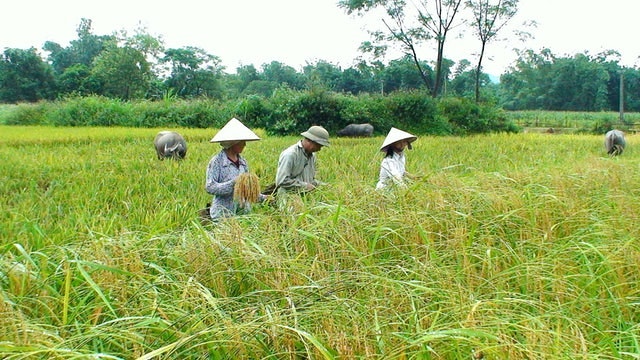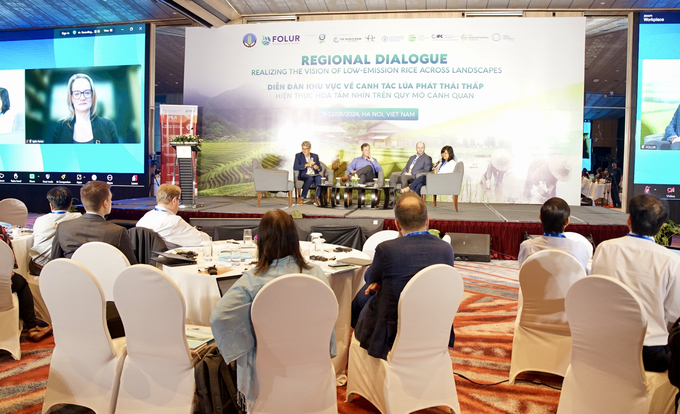June 20, 2025 | 12:12 GMT +7
June 20, 2025 | 12:12 GMT +7
Hotline: 0913.378.918
June 20, 2025 | 12:12 GMT +7
Hotline: 0913.378.918
Catur Utami Dewi introduces Ricolto is an international organization dedicated to achieving sustainable income for farmers and ensuring healthy food for all. With operations in 18 countries, it works through our regional offices in Southeast Asia, East Africa, West Africa, Europe, and Latin America. The organization's core mission was described to align with the goals of promoting sustainable agricultural practices, and events like this one resonate deeply with our ongoing efforts.
According to Ms. Dewi, a critical lesson Ricolto has learned is that sustainability is a shared responsibility. Farmers often view sustainability as improving their livelihoods, while consumers prioritize affordability and access to healthy food. Private actors, meanwhile, focus on creating value within the supply chain. Understanding these perspectives is essential to creating innovations and solutions that benefit everyone involved.

For any new initiative to succeed, there must be a strong enough incentive to motivate farmers to adopt new practices. Photo: Ricolto.
Another key insight is the importance of trust and communication in business relationships. For sustainable practices to take root, there must be transparency between farmers and private actors. Both sides must understand and respect each other’s needs to create shared goals and improve business outcomes. Strong relationships, built on trust and transparency, can help elevate the entire rice sector toward greater sustainability.
“Incentives, both financial and non-financial, play a significant role in driving these efforts. Certified rice varieties, for example, often fetch higher prices in the market, though demand may be limited by consumer purchasing power. In Indonesia, for instance, organic certified rice performs well, but its reach is restricted by the higher cost”, said Ms. Dewy.
Private actors are also investing in non-financial incentives like extension services, pre-financing for production inputs, and, in the case of the low-carbon rice project, purchasing carbon credits for emission reductions.
The challenge, however, lies in scaling these initiatives across the broader rice sector. With the right incentives, partnerships, and innovations, the Ricolto's representative believe the entire industry can move toward a more sustainable future, benefiting not only farmers but all actors in the value chain.
Shared the idea from the view of Corteva, Mr. Bryce Sturgess, affirmed that as food security is a vital issue for all of humanity, and it's only going to become a bigger challenge as we move forward. This makes collaboration through partnerships critical. Partnerships form the foundation of how we approach our on-the-ground work.
To address the question more directly, Corteva is an agricultural research and development organization, operating globally in 142 countries. Our focus lies in crop protection, seed innovations, and biological advancements to bring cleaner, greener, and more sustainable technologies to market. These innovations aim to reduce risks associated with Maximum Residue Limits (MRLs) and the overuse or underuse of resources, ultimately enabling safer and more efficient agricultural trade.
When the organization look specifically at Asia, where the majority of the world’s rice is grown, our on-the-ground projects have taught us that success hinges on personal connections. Face-to-face engagement with farmers is essential because seeing is believing. Building trust is critical, especially considering the aging farming population, which tends to be more conservative and hesitant toward change. For any new initiative to succeed, there must be a strong enough incentive to motivate farmers to adopt new practices.
“From Corteva’s perspective, and mine personally, farmers must be at the center of decision-making. Empowering and enabling farmers through partnerships is key to achieving long-term success in addressing food security. Their involvement in the process ensures that innovations and policies are aligned with their needs, making the entire system more sustainable and resilient”, Mr. Sturgess elaborated.
From the part of Sunrice Group - a multinational company headquartered in Australia, with rice mills in Australia, the U.S., and Vietnam, Kylie Porter shared that the Group sources rice from these regions, but also diversifies into other sectors.

Private sector discussed solutions on value chain perspectives and solutions for sustainable rice. Photo: Linh Linh.
Its primary focus has been in Australia, but it is increasingly involved in projects in Vietnam. Recently, Sunrice Group set emissions reduction targets in line with the Science-Based Targets initiative for verification. Like many companies here, we have significant Scope 3 emissions, particularly from rice production. So, the goal is to understand these emissions better and find ways to reduce them while ensuring that farmers can maintain or even improve their yields.
In Australia, Sunrice Group partnered with AgriFutures and Deakin University to collect gas flux data, which helps them understand how different sowing practices affect methane emissions. For example, trials have shown that switching from aerial sowing to direct drilling with delayed permanent water can reduce greenhouse gas emissions by 84%, a significant reduction. It plans to replicate similar projects in Vietnam, where many of commercial growers are already transitioning to alternate wetting and drying systems. Sunrice Group’s agronomists on the ground in both Australia and Vietnam are helping farmers adopt these practices.
“While these projects show great promise, we recognize that the challenges differ between countries. In Australia, farmers tend to have higher incomes and can invest in mechanization and technology more easily than smallholder farmers in Vietnam”, said Kylie.
However, the Group is working on proof-of-concept projects in Vietnam focused on enhanced fertilizer efficiency, mechanized planting, and carbon sequestration through biochar. Some of these are still in the pilot phase, but expected to commercialize them soon.
“In Vietnam, we've also partnered with the Australian Centre for International Agricultural Research (ACIAR) on a five-million-dollar project aimed at building a high-quality, sustainable rice value chain in the Mekong Delta. This initiative involves collaboration between scientists, growers, and the Vietnamese government, and includes the establishment of a Center for Excellence in Post-Milling. One of our key objectives is to encourage younger generations to remain engaged in the rice industry, especially given the aging farming population both in Vietnam and Australia”, shared Kylie.
![Turning wind and rain into action: [9] Digitizing hydrometeorological data in response to climate change](https://t.ex-cdn.com/nongnghiepmoitruong.vn/608w/files/news/2025/06/17/z6704423696987_15fd32ffc26d590d204d520c9dac6786-nongnghiep-165943.jpg)
(VAN) Farmers have begun accessing hydrometeorological applications to adjust their cropping schedules, aiming to ensure productivity and adapt to climate change.
![Turning wind and rain into action: [8] Real-time salinity detection and early warning technology](https://t.ex-cdn.com/nongnghiepmoitruong.vn/608w/files/news/2025/06/17/z6704423696987_15fd32ffc26d590d204d520c9dac6786-nongnghiep-151127.jpg)
(VAN) Thanks to the integration of modern hydrological-hydraulic models, remote sensing technologies, and artificial intelligence, the accuracy of hydrological forecasting has significantly improved.
![Turning wind and rain into action: [7] Early disaster warnings help marine farmers minimize losses](https://t.ex-cdn.com/nongnghiepmoitruong.vn/608w/files/news/2025/06/17/z6704423696987_15fd32ffc26d590d204d520c9dac6786-nongnghiep-142942.jpg)
(VAN) In recent years, thanks to early disaster warnings and forecasting, marine farmers in Khanh Hoa province have been able to reduce risks and losses, thereby improving production efficiency.
![Turning wind and rain into action: [6] ‘Four on-the-spot’ disaster management software](https://t.ex-cdn.com/nongnghiepmoitruong.vn/608w/files/news/2025/06/17/e5a48259d6a262fc3bb3-nongnghiep-183800.jpg)
(VAN) By simply activating the scenario on the disaster management software, the relevant authorities immediately know how many households need to be evacuated, where to evacuate them to, and by what means of transportation…
![Turning wind and rain into action: [5] Hue applies modern technology in disaster forecasting](https://t.ex-cdn.com/nongnghiepmoitruong.vn/608w/files/news/2025/06/17/z6704423696987_15fd32ffc26d590d204d520c9dac6786-nongnghiep-093938.jpg)
(VAN) In Hue city, modern technology has recently been applied in meteorological and hydrological forecasting and warning, helping to reduce the damage caused by natural disasters.

(VAN) A cutting-edge farming technique being implemented on an experimental ranch in Arizona's Sonoran Desert has already saved a billion gallons of water over five years, according to Civil Eats.

(VAN) Poultry and pig production and the environment can be boosted through enhanced water technology, according to new research.